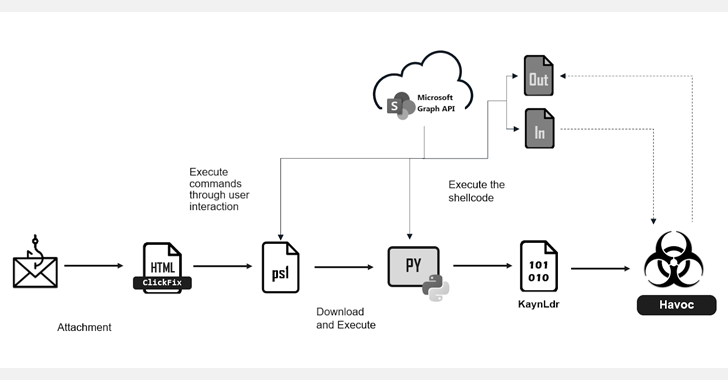-

Kroger CEO Rodney McMullen resigns amid personal conduct probe, interim leader named
Kroger CEO Rodney McMullen has resigned from the grocery giant. The company has appointed an interim leader.
-

Hackers Use ClickFix Trick to Deploy PowerShell-Based Havoc C2 via SharePoint Sites
Cybersecurity researchers are calling attention to a new phishing campaign that employs the ClickFix technique to deliver an open-source command-and-control (C2) framework called Havoc. “The threat actor hides each malware stage behind a SharePoint site and uses a modified version of Havoc Demon in conjunction with the Microsoft Graph API to obscure C2 communications within…
-

⚡ THN Weekly Recap: Alerts on Zero-Day Exploits, AI Breaches, and Crypto Heists
This week, a 23-year-old Serbian activist found themselves at the crossroads of digital danger when a sneaky zero-day exploit turned their Android device into a target. Meanwhile, Microsoft pulled back the curtain on a scheme where cybercriminals used AI tools for harmful pranks, and a massive trove of live secrets was discovered, reminding us that…
-

The New Ransomware Groups Shaking Up 2025
In 2024, global ransomware attacks hit 5,414, an 11% increase from 2023. After a slow start, attacks spiked in Q2 and surged in Q4, with 1,827 incidents (33% of the year’s total). Law enforcement actions against major groups like LockBit caused fragmentation, leading to more competition and a rise in smaller gangs. The number of…
-

Vo1d Botnet’s Peak Surpasses 1.59M Infected Android TVs, Spanning 226 Countries
Brazil, South Africa, Indonesia, Argentina, and Thailand have become the targets of a campaign that has infected Android TV devices with a botnet malware dubbed Vo1d. The improved variant of Vo1d has been found to encompass 800,000 daily active IP addresses, with the botnet scaling a peak of 1,590,299 on January 19, 2025, spanning 226…
-

Mozilla Updates Firefox Terms Again After Backlash Over Broad Data License Language
Firefox browser maker Mozilla on Friday updated its Terms of Use a second time within a week following criticism overbroad language that appeared to give the company the rights to all information uploaded by users. The revised Terms of Use now states – You give Mozilla the rights necessary to operate Firefox. This includes processing…
-

Executive Insights: Elevate Oregon’s Donell Morgan on empowering youth, building community through mentorship (video)
Candace Beeke, publisher and president of the Portland Business Journal, recently sat down with Donell Morgan, the executive director of Elevate Oregon, who has dedicated over 21 years to youth development. Morgan shares his journey from a career in basketball to mentoring and advocating for educational equity, emphasizing the importance of giving back to the…
-

Autodesk lays off 1,350, 9% of workforce
San Francisco software maker Autodesk, which has a sizable office in Portland’s Central Eastside, announced big layoffs this week.
-

The Blazers post NBA’s top leading viewership numbers in the NBA
Kevin Kinghorn, the Blazers’ chief marketing officer, said recent viewership numbers show that the team’s recent switch in broadcast partners is working.
-

Layoffs coming at Microchip plant in Gresham
Microchip Technology is stepping up its efforts to get inventories back in line with job gets at its Portland metro plant.

